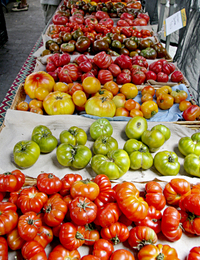“The salad days of organic salad are wilting in favor of high-tech tomatoes.”
Thus began a disturbing blurb in yesterday’s Wall Street Journal that forecasts a future in which organic produce may lose out to genetically modified and mass produced foods.
“Gourmets’ fears of ‘frankenfoods’…seem to be taking a back seat to the growing global demands of feeding emerging middle classes in developing countries with limited natural resources.”
The article cites the dramatic earnings growth of Monsanto, the world leader in agricultural biotechnology. (The company makes seeds that produce insect-resistent, drought-tolerant crops.)
All of this is not to say that farmers’ markets and organic heirloom tomatoes are going away. Just that the current popular aversion to genetically modified foods “is turning into more of a luxury for the wealthy than a practical option for the masses.”
The stats posted by Whole Foods are a little scary to this fan of “real” food, locally grown, in a sustainable fashion:
“From 2001 to the end of 2006, the company’s (Whole Foods) earnings grew an average annual rate of 25%. In 2007, earnings were down more than 10% and they’re falling further.”
Columnist Karen Richardson doesn't go into the specific "whys" of Whole Foods' earnings downturn. Nor does the article say how meeting the increased food demands of the planet will immediately impact the supply of organic foods. But it is, for sure, food for thought.

Comments